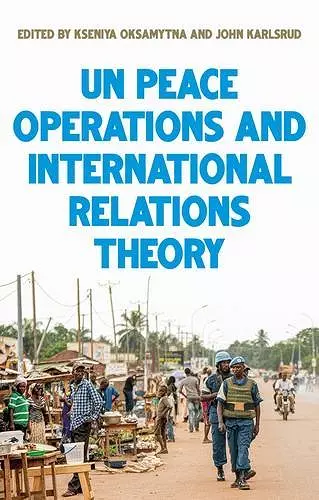United Nations Peace Operations and International Relations Theory
John Karlsrud editor Kseniya Oksamytna editor
Format:Hardback
Publisher:Manchester University Press
Published:11th Aug '20
Currently unavailable, and unfortunately no date known when it will be back

United Nations peace operations have undergone multiple transformations over the more than seventy years of their existence. Multidimensional peace operations have organised elections, helped deliver humanitarian assistance, advised on army and police reform, and fought rebel groups. Such operations not only represent a core pillar of the multilateral peace and security architecture but also fundamentally reshape lives of millions of people around the world.
This volume provides the first comprehensive overview of multiple theoretical perspectives on UN peace operations. It offers practical examples of how International Relations theories apply to specific policy issues and simultaneously demonstrates how major debates on UN peace operations - on civilian protection, local ownership, or gender mainstreaming - benefit from theoretical exploration. With insightful contributions from a range of international academics, UN peace operations and International Relations theory is an essential book for scholars, students, and experts working on peace and security and the broader issue of international cooperation.
This book is relevant to United Nations Sustainable Development Goal 16, Peace, justice and strong institutions
This excellent book successfully engages the literature on UN peacekeeping with scholarship on international relations (IR) theory. Oksamytna (King’s College, London) and Karlsrud (Norwegian Institute of International Affairs) have arranged the contributions of nine scholars into a superb "one-stop shop" for readers who want an overview of how different theoretical perspectives address the issue of post–Cold War UN peacekeeping operations. Contributors examine the capabilities and limits of individual IR theories for explaining peacekeeping missions and their effectiveness. All seek to answer the same question: "Why does UN peacekeeping take the shape that it does,” applying a particular theory of IR to a case study from their own research. Together they highlight the shortcomings of the dominant realist theory and the important contribution of alternative theories (from constructivism and liberal institutionalism to practice theories, including critical security studies, feminist institutionalism, and complexity theory) to the understanding of phenomena (such as peacekeeping) that do not neatly fit the realist model.
CHOICE
'This is a long overdue contribution that sits at the intersection of critical reflection and good old-fashioned scholarship. Composed of nine chapters that succinctly weave the evolution of UN peacekeeping missions together with major theories in International Relations (IR), this volume will serve as an important learning resource for young academics. Readers who remain uninspired after finishing this volume are likely to be few and far between.'
International Affairs
ISBN: 9781526148872
Dimensions: 216mm x 138mm x 16mm
Weight: 440g
256 pages